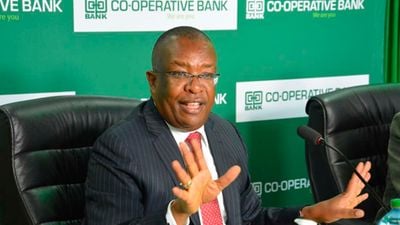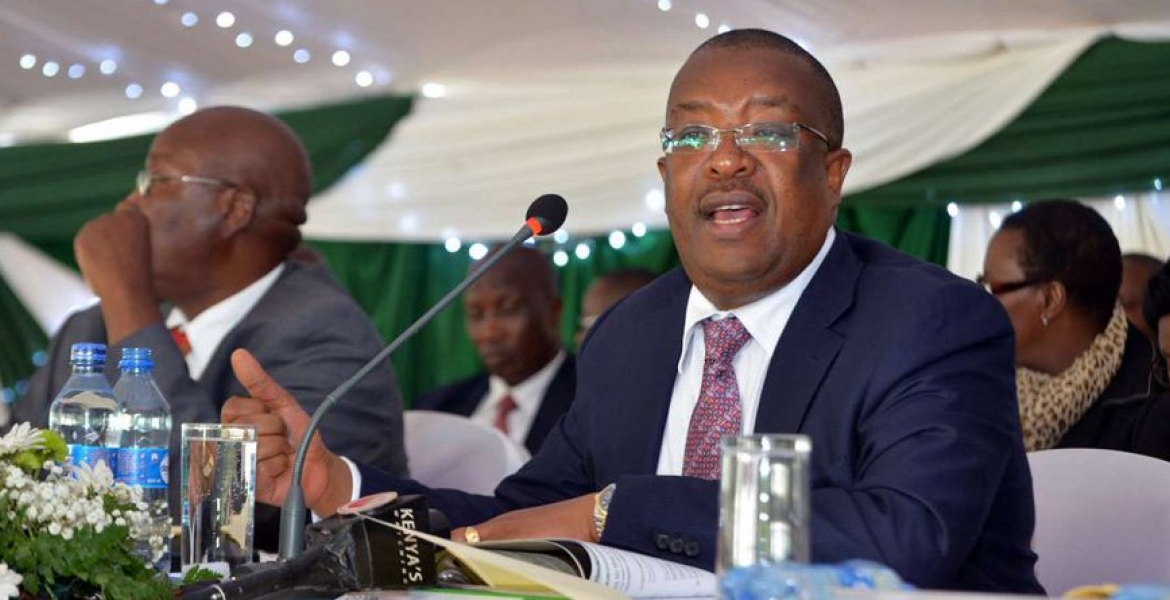
Co-op Bank Group is pleased to report a Profit Before Tax of Kshs. 10.5 Billion for the second quarter of 2021, a commendable 10% growth compared to Kshs. 9.6 Billion recorded in the second quarter of 2020.
This represents a strong Profit After Tax of Kshs. 7.4 billion compared to Kshs. 7.2 Billion reported in
second quarter of 2020.
Key highlights; –
1. Financial Position; The Group has registered sustained growth as
hereunder;
Total Assets grew by Kshs 59.1 Billion) (+12%) to Kshs. 573 Billion
compared to Kshs 513.9 Billion in the same period last year.
Net loans and advances book grew by Kshs 29 Billion (+11%) from
Kshs.272.2 Billion to Kshs. 301.2 Billion.
Investment in Government securities grew by Kshs.59.6 Billion (+49%) to
Kshs. 182 Billion compared to Kshs. 122.4 Billion in 2020.
Customer deposits grew by 6% from Kshs. 384.6 Billion to Kshs 407.7
Billion.
Borrowed funds from development partners grew by Kshs. 18.8 Billion
(+73%) to Kshs 44.4 Billion from Kshs.25.6 Billion in 2020.
Shareholders’ funds grew to Kshs. 92.6 Billion (+16%) from Kshs. 80.1 Billion in 2020 enabling us to continue pitching for big ticket deals.
2. Comprehensive Income;
Total operating income grew by 20% from Kshs 24.2 Billion to Kshs 29.2 Billion.
Total non-interest income grew by 24% from Kshs 8.3 Billion to Kshs 10.3
Billion.
Net interest income grew by 18% from Kshs 15.9 Billion to Kshs 18.8
Billion.
 Total operating expenses grew by 28% from Kshs 14.6 Billion to Kshs. 18.7 Billion on account of 123% prudential growth in loan-loss provisions.
Total operating expenses grew by 28% from Kshs 14.6 Billion to Kshs. 18.7 Billion on account of 123% prudential growth in loan-loss provisions.
3. Credit Management remained a key focus areas in this season notably with the following key interventions;-
a. The Credit Risk Adaptation Project dubbed ‘Project Kilele’ supported by a Global consulting firm;
End-to-end assessment of credit risk management practices by undertaking a comprehensive diagnostic review touching on each area of credit risk, including credit risk management framework with a key focus on risk governance, credit risk appetite, origination and underwriting process, credit approval process, credit scoring/rating models, and pricing.
Strengthen portfolio assessment and risk frameworks.
Enhance Collection platforms aligned to the new business operating environment.
The project is now in the implementation phase with ‘quick wins’ being realized in underwriting process with improved turnaround time
in our lending operations, monitoring based on our new Early Warning System and Collections with Client-Level Action Plans.
b. The Decentralization of Loan Portfolio Management, to the Branches, Lending Units and Relationship Management teams to enhance collection activities. The project dubbed ‘3C’ (Connect, Collect, Cure) entails proactive management of the Credit book re- assigned from Remedial Credit to Branches and Business Segments.
The Group prudentially increased loan loss provisions to Kshs. 4.2 Billion in the second quarter of year 2021, in appreciation of the challenges that businesses and households continue to face due to the economic effects of the ongoing pandemic.
We continue to actively engage our customers to support them through this period, by re-aligning the servicing of facilities, funding and transactional needs as the situation unfolds. A total of Kshs. 49 Billion in loans was restructured during the CBK restructure window that ended on 31 st March 2021 to support customers impacted by the pandemic.
The restructured facilities are largely performing as per the realigned agreements. Our customers continue to show resilience therefore improving their repayment as the economy picks up in various sectors.
4. A Strong Digital Footprint;
Through our multi-channel strategy, the Bank has successfully moved 93% of all customer transactions to alternative delivery channels, an expanded 24-hour contact centre, mobile banking, 576 ATMs, internet banking and over 25,000 Co-op Kwa Jirani banking terminals.
A successful Universal Banking model and the implementation of Sales Force Effectiveness has seen the Group serve over 8.8 million Account holders across all sectors.
Key focus on digital banking, with the all-telco Mco-op Cash Mobile Wallet continuing to play a pivotal role in the growth of non-funded
income with 5.2 Million customers registered and loans worth Kshs 33.5 Billion disbursed year-to-date, averaging Kshs. 5.6 Billion per month.
Over 127,760 customers have taken up the MSME packages that we rolled out in 2018, and 13,015 have been trained on business management skills. To date we have disbursed Kshs. 28 Billion to MSMEs through our E-Credit solution.
Our unique model of retail banking services through Sacco FOSAs enabled us provide wholesale financial services to over 479 FOSA outlets, and issue over 1.4 million Sacco-Link cards.
5. Subsidiaries;
Co-op Consultancy’s Insurance Agency posted a Profit Before Tax of Kshs 433.8 Million as at 30 th June 2021, riding on strong penetration of Bancassurance business.
Co-operative Bank of South Sudan that is a unique joint venture (JV) partnership with Government of South Sudan (Co-op Bank 51% and GOSS 49%) returned a monetary loss of Kshs 290 Million in Q22021 attributable to hyperinflation accounting due to currency devaluation of the South Sudanese pound.
Co-op Trust Investment Services contributed Kshs. 47.9 Million in Profit Before Tax in Q22021, with Funds Under Management standing at Kshs. 179.4 Billion compared to Kshs. 120.3 Billion as at Q22020.
Kingdom Bank Limited has contributed a Profit Before Tax of Kshs. 275 Million in Q22021. This is compared to 2020 full year loss of Kshs. 124 Million.
Co-op Bank holds a controlling 90% equity interest in Kingdom Bank, which is a fully-fledged Commercial Bank, regulated by the Central Bank of Kenya, with over 444,000 customers and 17 branches.
6. Long Term Financing: MSME, Sustainable Agriculture and Health sectors.
In 2020 the Group secured a long-term financing facility from the IFC (International Finance Corporation) amounting to Kshs. 8.25 Billion for on-lending to MSMEs at affordable terms.
The proceeds of the facility will support customers operating in the following key business areas;
Micro small and medium enterprises (MSMEs)
Businesses undertaking climate-smart projects, including agricultural inputs and sustainable agricultural practices, renewable
energy, energy efficiency and related areas.
The Bank has partnered with IFC and Philips (a leading health technology company) to support Africa’s health sector operators purchase essential medical equipment and strengthen their response to COVID-19 and other medical technology needs. This partnership is the first in Africa under the IFC-led Africa Medical Equipment Facility that makes available a US$ 300 million kitty to provide risk-sharing facilities to help small businesses acquire the equipment and tools they need by way of loans and leases.
The Group also secured a US$ 10 Million credit line in partnership with Eco.Business Fund to finance Sustainable Agriculture.
7. Co-op Bank launches Kenya’s first Pension-Backed Mortgage;
Following the enactment of the amendments to the Tax Act 2020, Retirement Benefits (Mortgage Loans) Regulations Amendments 2020, we rolled out a Pension-Backed mortgage facility whereby members currently contributing to a registered pension scheme, who are still in active employment, can access up to 40% of their accumulated pension benefits for the purpose of acquiring a residential property for own occupation.
A first in the market, the facility is expected to be a game-changer in accelerating home ownership for the over 3 million Kenyans currently
contributing to registered retirement benefits schemes. The Co-op Bank Pension-backed Mortgage will support contributors whose 40%
accrued pension may not be sufficient to purchase a home to apply for a top-up facility to meet the cost of acquiring a home.
8. Corporate Social investment;
Co-operative Bank Foundation has provided Scholarships to gifted but needy students from all regions of Kenya.The sponsorship includes; fully paid secondary education, full fees for University education, Internships and career openings for beneficiaries. The foundation is fully funded by the bank and has so far supported 8,340 students since the inception of the program.
Conclusion;
The Co-operative Bank Group continues to execute a proactive mitigation strategy anchored on a strong enterprise risk management framework, to enable uninterrupted access to banking services.We shall, riding on the unique synergies in the over 15 million-member co-operative movement that is the largest in Africa,continue to pursue strategic initiatives that focus on resilience and growth in the various sectors as the economy continues to recover.









